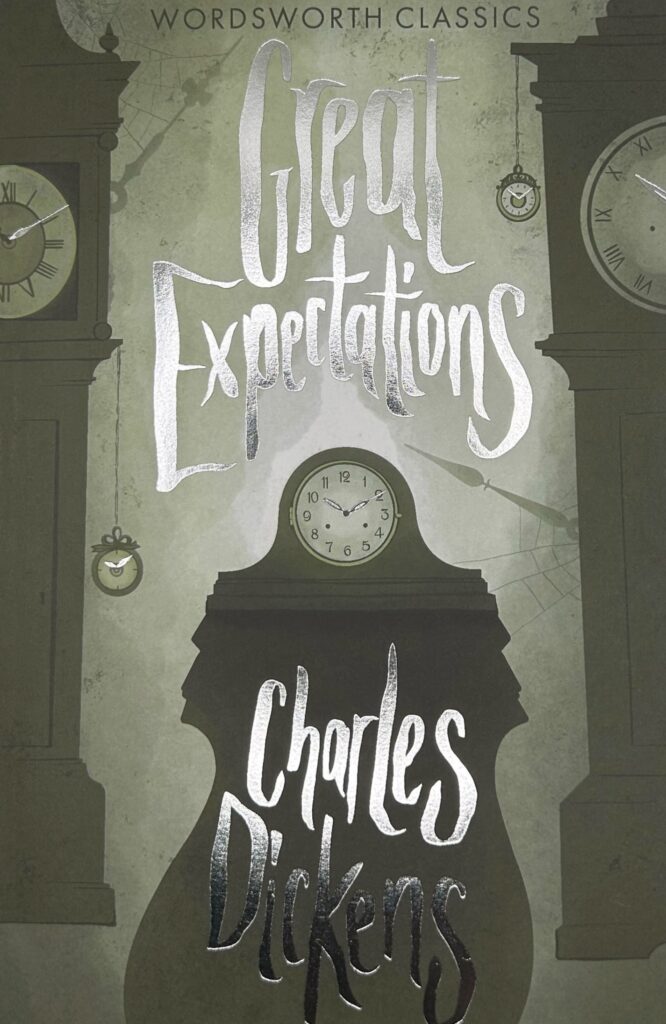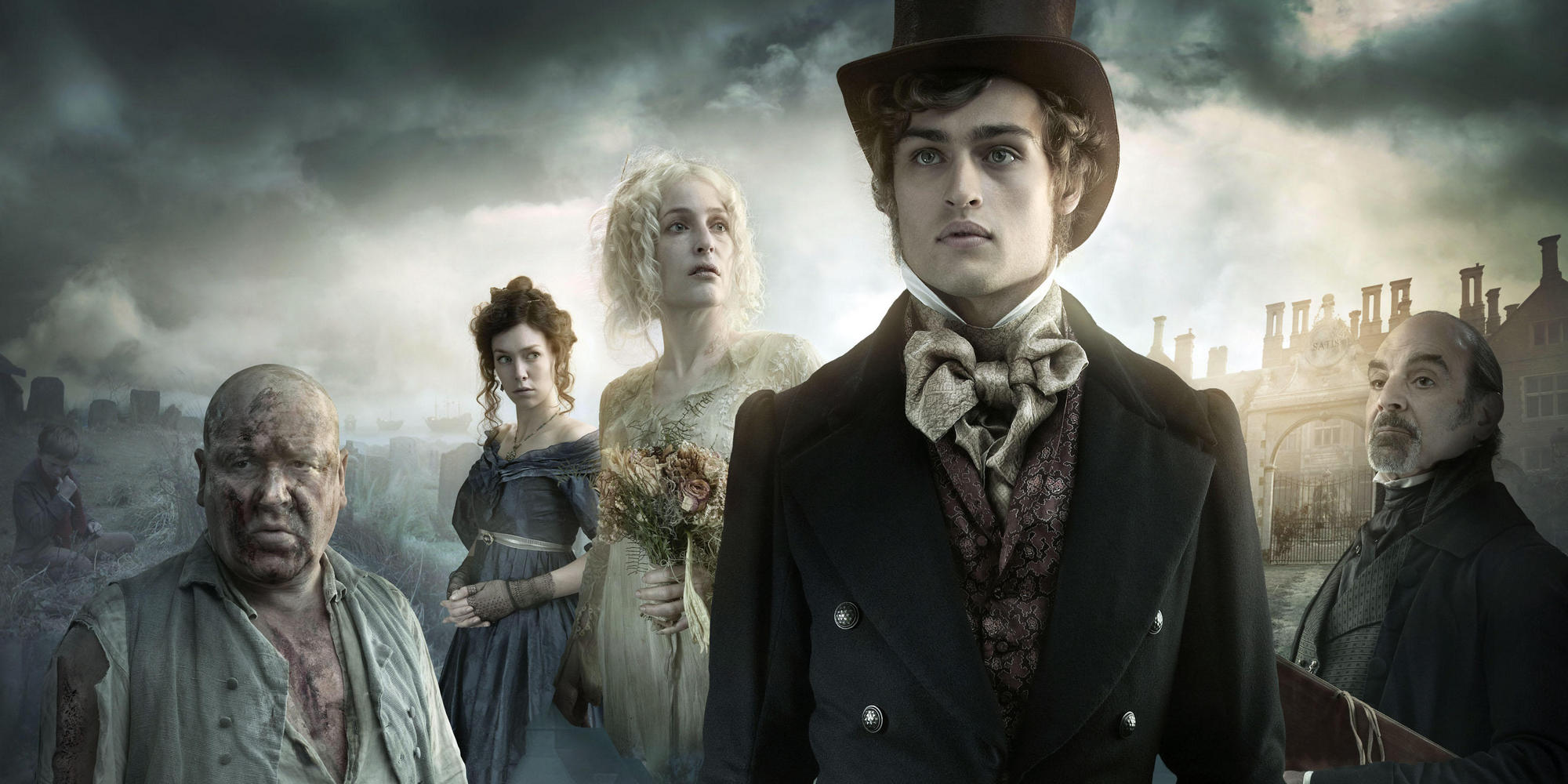
Filming Great Expectations: Part 2
PART TWO: ‘As being calc’lated to lead to larks!’
It was inevitable that Great Expectations would eventually find its way to television, which it first did in a heavily truncated version performed live over two episodes of the NBC dramatic showcase series Robert Montgomery Presents in 1954. This was a prestige show for its time, known for high production values that tempted many Hollywood stars to appear. If this has survived, I’ve not been able to find it, which is a shame as Roddy McDowell as Pip and old school board-treader Estelle Winwood as Miss Havisham would be well worth seeing.
The novel has, of course, also been adapted multiple times by the BBC. The first of these was a 13-part serial broadcast in 1959 written by P.D. Cummins, a journeyman TV scriptwriter, which by all accounts makes a good stab at covering the entire novel. The versatile British character actor Dinsdale Landen played Pip, Helen Lindsay (a familiar face to us from shows like Poirot, Doctors, and Midsummer Murders) was Estella, and stately old thesp Marjorie Hawtrey played Miss Havisham. Nigel Davenport was Bentley Drummle. The serial has unfortunately gone the way of much BBC archived material, and the eighth episode has been lost. It was never released on video or DVD, though you can find part of the opening scene on YouTube if you look hard enough.
The BBC returned to the novel in 1967 with a spirited adaptation in ten 25-minute episodes written by the celebrated Irish playwright and screenwriter Hugh Leonard. (Leonard also adapted Wuthering Heights and Nicholas Nickleby for the BBC – twice in both cases in the sixties and seventies – as well as Dombey and Son and The Moonstone.) Unlike David Lean’s 1946 film version of the story, Leonard reintroduced the Orlick story arc (played by wonderful bad guy Ronald Lacey), though he didn’t bother with Mr. Wopsle, the tragedy always being more interesting than the comedy. The casting is excellent, a showcase of British talent from the era: Francesca Annis played Estella, Neil McCarthy was Joe, Richard O’Sullivan was Herbert, Peter Vaughan was Jaggers, Bernard Hepton, Wemmick, and Hannah Gordon, Biddy. The Australian character actor John Tate played Magwitch and Shakespearean actor Maxine Audley was an amazing Miss Havisham. Pip was played by the actor and singer Gary Bond. Most associated with the West End, Bond was the original Joseph in Tim Rice and Andrew Lloyd Webber’s Joseph and the Amazing Technicolor Dreamcoat. Openly gay, Bond was a trailblazer in theatre in the sixties and seventies and was romantically involved with Jeremy Brett and Ian McKellan. The serial was a huge hit when originally broadcast and is considered significant enough in the history of UK TV drama to have warranted a DVD release in 2017, although the quality is poor as the BBC wiped the original masters, the show having to be recreated from 16mm film copies.
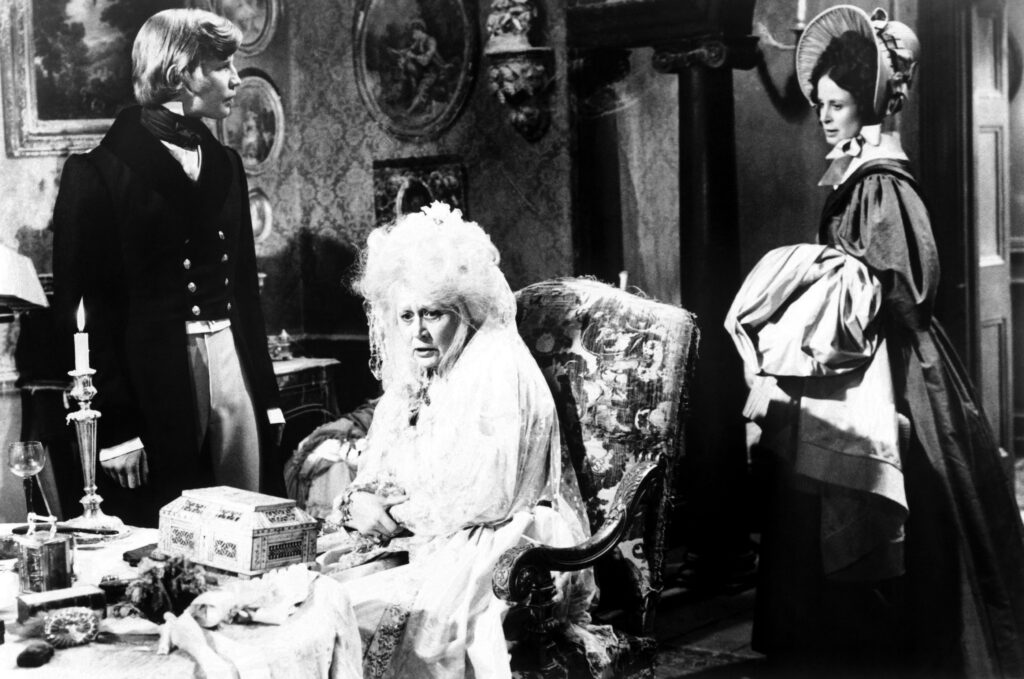
Michael York, Margaret Leighton, Sarah Miles, 1974.
The BBC left Great Expectations alone in the seventies, leaving it to Sir Lew Grade’s company, ITC, to pick up the torch in 1974. The original plan was to follow Lionel Bart’s Oliver! and make this version a musical, although the songs were dropped early on in production in favour of straight drama and a conventional soundtrack by Maurice Jarre (a composer most associated with David Lean, having scored Lawrence of Arabia, Doctor Zhivago, and A Passage to India). Like the previous BBC version, the cast is wonderful: Michael York as Pip, Sarah Miles as Estella, James Mason as Magwitch, Margaret Leighton as Miss Havisham, Robert Morley as Uncle Pumblechook, Anthony Quayle as Jaggers, Joss Ackland as Joe Gargery, and Rachel Roberts as Mrs. Joe. Made for US television but released in cinemas in the UK (I remember being dragged to see it), despite the talent on show, this is the version everyone hated. Sherman Yellen’s script is mawkish and sentimental, and the reinstatement of Mr. and Mrs. Wopsle as comic relief is a disaster. Only Margaret Leighton’s perversely cruel Miss Havisham and Joss Ackland’s rustically noble Joe stand out. In an odd break with tradition noted by several contemporary reviewers, while Pip was still played by two different actors, Sarah Miles (then 33) was both the child and adult Estella, which struck a rather discordant note. Director Joseph Hardy recklessly went on record saying that he hoped audiences would not compare his version with that of David Lean. Critics lined up to respond that he needn’t worry, because no one would ever mention the two in the same breath. The previous BBC versions were also frequently cited as being far superior, despite the constraints of television budgets. The Listener review said it all: ‘Everything is wrong about it with a sort of dedicated, inspired wrongness that, in itself, is breath-taking.’ It reminds me of the schmaltzy American TV version of A Christmas Carol Bill Murray’s evil executive Frank Cross is producing in Scrooged.
Wisely keeping their powder dry, the BBC returned to Great Expectations in 1981 with a 12-part, 30-minute episode serial starring the tragic British actor Gerry Sundquist, a decent leading man whose ultimate failure to launch after a promising start led to drug addiction and suicide. Casting highlights include Stratford Johns as Magwitch, Joan Hickson as Miss Havisham, and Patsy Kensit as Young Estelle. Stalwart character actor Colin Jeavons played Wemmick, having also appeared as Herbert Pocket in the original 1959 serial. The show was produced by Barry Letts, a name most closely associated with Doctor Who, and written by James Andrew Hall, who would go on to also adapt The Invisible Man for the BBC in 1984. Hall sensibly returns to the original novel, using the relative freedom of a long serial to reintegrate characters and subplots that are more usually abandoned. (Even ‘Trabb’s boy’ gets a look-in.) As anyone who remembers watching BBC costume dramas in the late seventies and early eighties will attest, this was something of a high watermark for intense and challenging literary adaptation, not matched again until the Dickens revival on the BBC that followed Andrew Davies’ astonishing version of Bleak House in 2005. The 1981 version was released on DVD in 2005 on the back of renewed interest in Dickensian drama but is not easy to find these days.
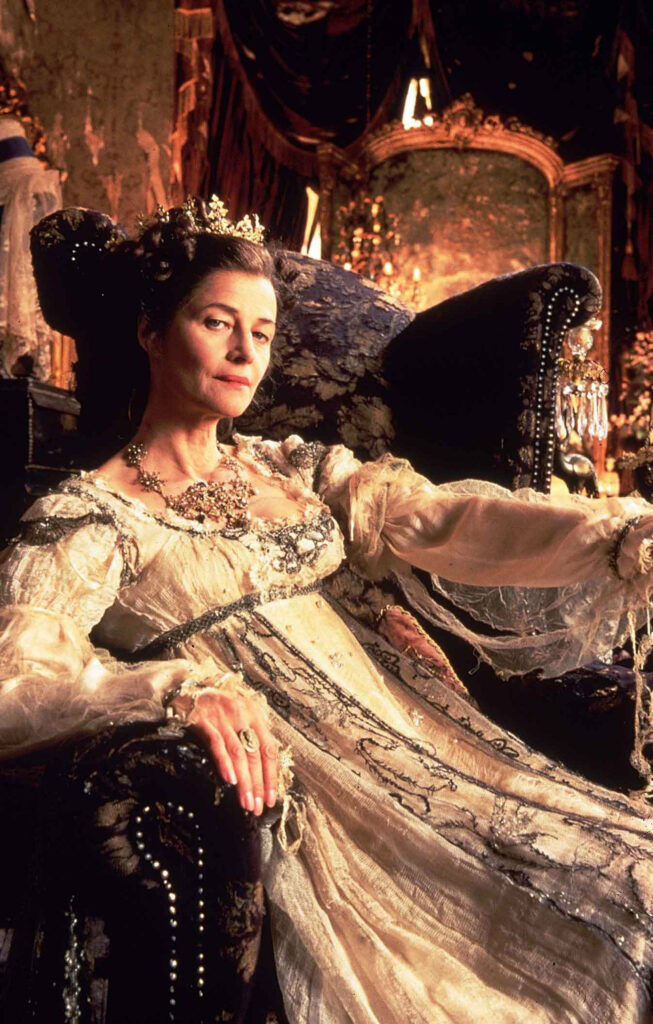
The Miss Havishams: Charlotte Rampling
The novel’s next outing was on the Disney Channel in 1989 in a surprisingly solid and loyal adaptation. Running to five hours over three episodes, scriptwriter John Goldsmith (a veteran of The Professionals and The New Avengers), brings more character development and plot cohesion to the drama than most, while also returning to Dickens’ ambivalent published ending. Notable cast members include Anthony Hopkins stealing every scene as Magwitch, John Rhys-Davies as Joe Gargery, Ray McAnally as Jaggers, Frank Middlemass – one of those actors made for Dickens – as Uncle Pumplechook, and Jean Simmons returning to the story, this time as Miss Havisham. For Dickens purists, this is probably the closest adaptation of the novel you are likely to see.
The trail then grows cold for almost ten years, until director Alfonso Cuarón and screenwriter Mitch Glazer take the novel out of a whole new door in their updated film version of 1998. The story is set in contemporary New York and although the original premise remains, character names have been updated. Pip is now Finn Bell (played by Ethan Hawke) and a struggling artist, Joe Gargery is Joe Coleman (Chris Cooper), Bentley Drummle becomes the wealthy businessman Walter Plane (Hank Azaria), Miss Havisham is Ms. Nora Dinsmoor (Anne Bancroft), a wealthy Florida recluse, and Magwitch is mobster Arthur Lustig (Robert De Niro), who has escaped from Death Row. Estella (Gwyneth Paltrow) is still Estella. A modern version was a gutsy move, but the film never really delivers on the promise of the first act and Young Finn’s interactions with De Niro who is, as ever, superb, and Bancroft’s Miss Havisham figure. As Hawke also argued when Cuarón first approached him about the project, a more authentic American update would have made Pip a black or Hispanic character, using race to reflect contemporary social inequality just as Dickens had used class in the original. Given the welcome ethnic diversity on display in Stephen Knight’s upcoming FX/BBC version of Great Expectations (following Armando Iannucci’s lead in The Personal History of David Copperfield), we may be about to see this kind of engagement. Cuarón’s Great Expectations is neither good nor bad – though the nineties pop soundtrack is pretty cool – and it was buried at the box office by James Cameron’s Titanic, which hit the movie theatres at the same time, audiences deciding that one epic romance that year was more than enough.
The following year saw another BBC adaptation, this time written by playwright and prolific TV dramatist Tony Marchant and directed by Julian Jarrold, who is probably best known for Kinky Boots (2005) and his 2008 version of Brideshead Revisited. Ioan Gruffudd – ‘Mr. Fantastic’ himself – plays Pip, supported by Justine Waddell (The Fall, Killing Bono) as Estella, Charlotte Rampling as Miss Havisham, and Bernard Hill as Magwitch. This was a two-part miniseries running to 198 minutes. The series is notable for its use of authentic Kent locations, and for its lush period mise-en-scène, winning a BAFTA TV Award for Best Costume Design. The principal cast is excellent, with performances that are more subtle and understated than one usually finds in adaptations of Dickens. For the first time, some critics began to wonder if Lean’s version had finally been knocked off its perch when it came to a straight and visually sumptuous interpretation of Dickens’ novel. Released on Masterpiece Theatre in the US, the show was memorably satirised in the ‘Pip’ episode of South Park, which begins as a relatively loyal retelling and then becomes increasingly surreal as Miss Havisham uses the tears of Estella’s broken-hearted lovers to power her ‘Genesis Device’. Looking at it now, Jarrold’s version forms an interesting conceptual bridge between the ‘classic’ adaptations of the twentieth century, and the more recent versions, including Knight’s forthcoming reimagining, which are much more slick, filmic, and hyper-real.
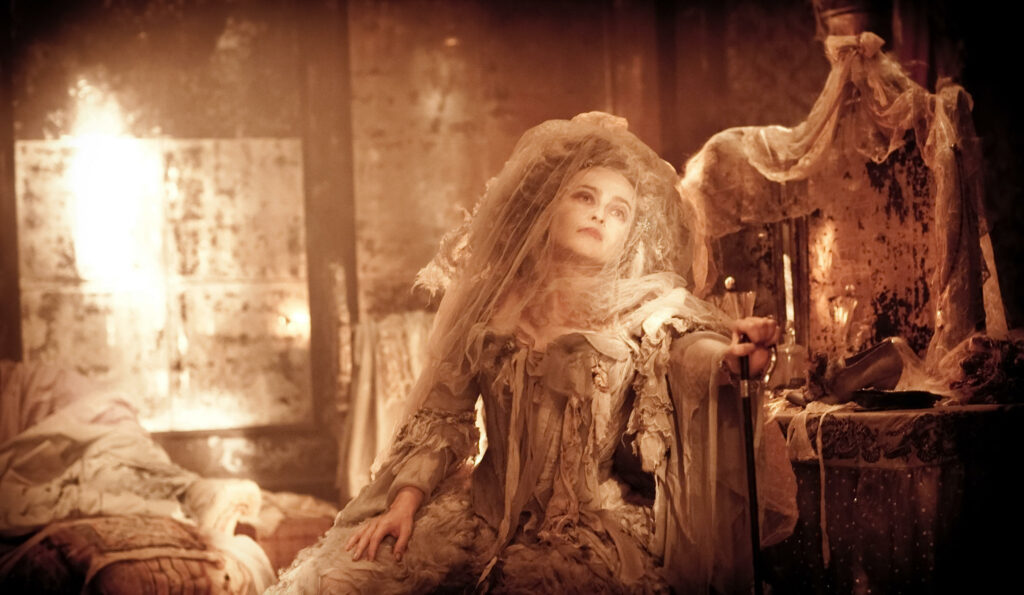
The Miss Havishams: Helena Bonham-Carter
This brings us almost up to date, or perhaps full circle. 2011 and 2012 respectively delivered two new versions of Great Expectations, another BBC serial adaptation, followed by a new film version (co-produced by BBC Films) directed by Mike Newell. Newell’s 2012 film has a lush visual sense of high and low Victorian culture, but it unfortunately suffers in comparison to the 2011 television series. It is this contrast that makes Newell’s film seem pedestrian and old-fashioned, and much less impressive than it deserves. Were this the only recent adaptation, it would likely be more celebrated, particularly for the casting of goth icon Helena Bonham Carter as Miss Havisham.
It is a strange experience to watch these productions back-to-back, and having just done so I find myself imagining a synthesis of the two combining both casts. Solid though Shaun Dooley was as Joe in the 2011 version, for example, Jason Flemyng in Newell’s film was pitch perfect, raw, honest, and noble. Similarly, I thought Jeremy Irvine (War Horse) was a more authentic and earnest Pip than the slightly boy-bandish Douglas Booth in the 2011 version. Sally Hawkins as Mrs Joe in Newell’s film is also impressive, although like her 1946 counterpart she is killed off quickly offscreen of natural causes, whereas the 2011 TV version retains her assault by Orlick. In Newell’s film, Biddy’s full story is also restored from the novel, which is unusual and adds another layer of emotional depth to both Pip and Joe. Then there are the equally strong and very different performances across roles which are just too close to call, for example Jaggers – David Suchet (2011) and Robbie Coltrane (2012) – Molly – Susan Lynch (2011) and Tamzin Outhwaite (2012) – Wemmick – Paul Ritter (2011) and Ewen Bremner (2012), and Herbert Pocket – Harry Lloyd (2011) and Olly Alexander (2012). After this though, the quality of the performances becomes more unbalanced. Mark Addy’s 2011 Pumblechook catches the original character with just the right blend of vulgarity and arrogance whereas David Walliams in 2012 slices the ham rather too thick. Vanessa Kirby’s 2011 Estella is a stronger performance than Holliday Grainger’s 2012 version, though both characters are taken in interesting directions. The 2011 version unflinchingly depicts the domestic abuse Estella suffers at the hands of her husband, Bentley Drummle, while Newell’s is presented like a fairy-tale princess imprisoned by a wicked witch in a ruined castle. The latter is a nice metaphor, although we are left in little doubt throughout the movie where Estella’s heart truly lies, in opposition to Kirby’s more subtle and ambivalent performance. The same is unfortunately true of Miss Havisham and Magwitch. Gillian Anderson’s neurotic and hysterical portrayal in the 2011 serial – which also seems to be channelling Bette Davis in Whatever Happened to Baby Jane? – brings something genuinely unique and original to a character otherwise done to the point of cliché. (As Lean noted, she can easily veer into farce.) Like the mouldering Satis House, she decays with every passing episode, obsessively scratching at eczema while becoming paler and more vampiric, in a fading wedding dress that eschews the popular meringue-style in favour of something more authentic and Victorian. Her death also hints at suicide, rather than the more traditional accident. Although Helena Bonham Carter should be perfect in the role in Newell’s film, her interpretation suddenly feels dated after Anderson’s, as if she’s wandered in from a Tim Burton movie, her voice and demeanour recalling Mrs Lovett from Sweeney Todd. Without the competition, this would have been a fine addition to Miss Havisham’s ever-growing army, but now Anderson has completely revised the role. I wonder if Olivia Coleman in Knight’s new version will be able to top her either – her character’s use of the horrible cliché ‘And so it begins’ in the official trailer does not bode well, though she does look as if she might be smoking opium… Magwitch is the same. Though Ralph Fiennes is more than adequate in Newell’s movie, he has to follow Ray Winston at the top of his game, the mud and blood and shaven head taking us all the way back to Finlay Currie. (Winston is also genuinely working class, having grown up on an East End council estate.) His performance and range in this complex role is stunning, and another very tough act to follow.
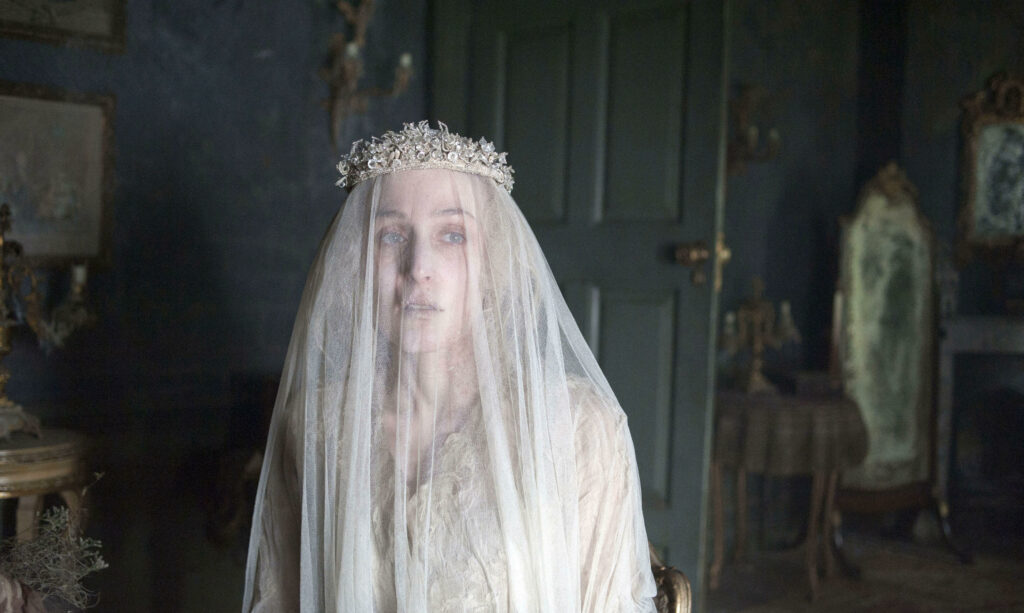
The Miss Havishams: Gillian Anderson
The 2011 BBC serial was written by Sarah Phelps, a veteran EastEnders screenwriter who graduated to adapting Agatha Christie for television. It was directed by Brian Kirk, who is known for his beautiful TV adaptation of David Haig’s play My Boy Jack. Kirk also has numerous directorial credits on The Tudors, Brotherhood, The Riches, and Game of Thrones. This pair bring a lot of talent and experience to TV drama. At three hour’s running time, the screenplay has room to breathe, although like most adaptations the end of the novel is condensed so that Pip’s time working abroad with Herbert is omitted. For the purposes of drama, this is a perfectly acceptable move, and Pip secretly supporting Herbert’s professional interests remains (as it does in Newell’s film), a plotline that Lean’s writing team had cut in 1946. In Estella, Phelps teases out the romance by subtly suggesting with a single tear that she is genuinely attached to Pip when they are children. The screenplay also makes more of Pip’s role in the class war. While he often transitions quite smoothly in older adaptations of the novel, including Lean’s, Drummle is well aware in Phelp’s script that Pip is ‘not one of us.’ Alongside Lean’s movie, the 2011 Great Expectations is the strongest adaptation by far, remaining faithful to the essence of the original, but with the odd twist, crafted with heart, conviction, and intelligence. This is the version Stephen Knight must rival, and indeed supersede, to truly succeed dramatically.
It is not, therefore, that Newell’s 2012 film is particularly flawed, but that the serial by Phelps and Kirk is just so good, so original, so innovative, so well-acted. There simply seems no reason to have remade the story again so soon, and one wonders what the BBC executives were thinking. Newell is, of course, an excellent director, his numerous credits including Four Weddings and a Funeral, Donnie Brasco, Harry Potter and the Goblet of Fire, and High Fidelity, and his Dickensian settings are lavish, reflecting the bigger budget of film over television and his eye for the moving pageant of early Victorian London. Novelist and screenwriter David Nicholls, meanwhile, seems to be guided largely by David Lean’s original movie, almost scene for scene at times, suggesting a certain lack of vision. His most interesting move is to develop the class rivalry between Pip and Drummle, and to show the absolute arrogance and privilege of the upper-class male. The Finches of the Grove club scenes are particularly provocative, and I suspect intended to remind the audience of the antics of David Cameron, George Osbourne, and Boris Johnson at the infamous Bullingdon Club at Oxford. If only the 2011 serial didn’t exist, this would be a good movie, but in copying much of what David Lean did in 1946, all it really does is remind us of how good the original was and remains, even after all this time.
Lean set the standard for filming Dickens, with an insight and style that goes way beyond getting the costumes right or selectively dramatising scenes from the original novels. Lean got inside the text, understanding the true nature of Dickens’ unique genius, and in doing so found a way to recreate his literary technique on film. I’m not convinced anyone else has yet to achieve this to the same level, not even Phelps and Kirk, although at least they brought something fresh to the table. Whether Stephen Knight has done the same remains to be seen, but it’ll be fun finding out. Whatever he does with the material, I think we can all agree based on his previous work that it certainly won’t be boring. It won’t be the final version of Great Expectations either. For whatever reason, this story just runs and runs. What larks, eh?
Main image: Cast of the BBC Production 2011. Credit: © BBC 2011 / Photo Nicola Dove Contributor: Collection Christophel / Alamy Stock Photo
Image 1 above: GREAT EXPECTATIONS, from left: Michael York, Margaret Leighton, Sarah Miles, 1974.
Contributor: Everett Collection Inc / Alamy Stock Photo
Image 2 above: ITC production 1974. Credit: Everett Collection Inc / Alamy Stock Photo
Image 3 above: Outsource Media Group 2012 Credit: PictureLux / The Hollywood Archive / Alamy Stock Photo
Image 4 above: See main image
Books associated with this article
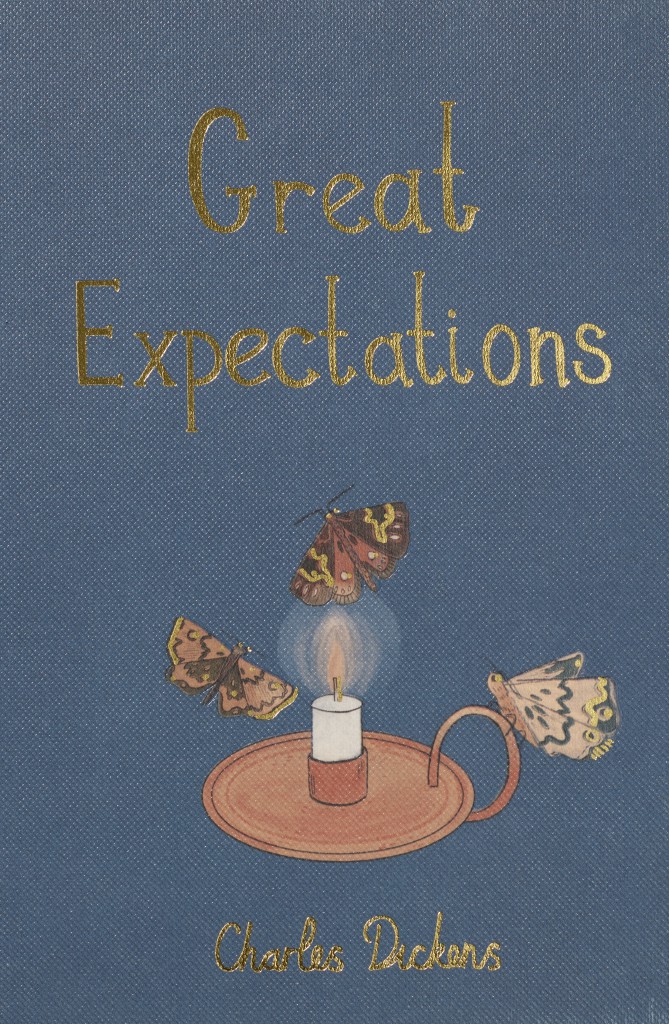
Great Expectations (Collector’s Edition)
Charles Dickens
